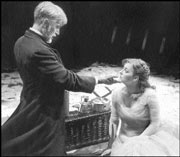THE LADY FROM THE SEA
Seattle Center, Intiman Theatre, 269-1900, $10-$42 7:30 p.m. Sun. and Tues.-Thurs.; 8 p.m. Fri.-Sat.; 2 p.m. matinees Sat-Sun. and Wed. Sept. 19 ends Sat. Sept. 22
“IT” DIRECTOR Kate Whoriskey’s staging of The Chairs at Intiman last season successfully paired her imagination with Ionesco’s absurdism. His work, already so rich with imagery, opened its arms to the wealth of the director’s visual panache. Ibsen’s The Lady from the Sea, which opened last week at Intiman, is not nearly so welcoming to Whoriskey. While the evening is technically skillful—Robert Perry’s keen lighting design alternately turns the set blue, green, and yellow—it is also ploddingly obtuse.
Playing Ellida, a married woman haunted by the virile memory of the absent sailor to whom she was once promised, Kristin Flanders spends the play shuffling in her gown across the torn sections of cardboard that cover the entire floor of the stage. The vision may make for a thoughtful metaphor in theory—a lady trapped in tulle dragging over her ragged memories—but in practice it’s just two hours of an actress shuffling across torn sections of cardboard. You don’t feel exhilarated when Whoriskey gets punchy with this text. Reaction to most of her offbeat touches is not “wow!” but “huh?”
Flanders, so ideal as the betrayed wife in ACT’s recent Dinner with Friends, doesn’t triumph as this young bride, and seems to sense the disparity between what Ibsen is saying and what her director is doing. The actress has to swing back and forth from Whoriskey’s daring surrealism to the director’s almost parodic decision to remind us that this is Ibsen, after all, by sending Flanders downstage every now and then to sob something heightened and poetic about the sea. It’s a mannered performance, tightly wound where it should be fevered and dreamy.
The universal timelessness of Ellida’s Act II plea for free will is quite affecting, and Philip Goodwin nicely underplays her husband as an average man struggling with something he’s never had to understand. Moments in this act concerning the social imprisonment of his two longing daughters (Dawn Frances and Lisa Strum) have potential, too. Yet Whoriskey, in a playful mood, sets them up as some sort of surly Tweedle-Dee and Tweedle-Dum in stark matching outfits—you can’t view them with compassion. After Boletta (Frances) tells her estranged new mother Ellida that sister Hilda (Strum) is waiting “for a single word of affection,” we don’t feel moved by the ensuing reconciliation because we’ve seen no previous sign of this need in either of the girls.
Whoriskey’s attempt to enliven the work is valiant, but she has inadvertently overpowered the human element. And while otherworldly appearances by the sailor have visual kick, Jason Cottle, glowering in French, comes off too hammy as that seductive Stranger. The show finally resembles the distraught Ellida in one disappointing way: It’s caught between two worlds.








